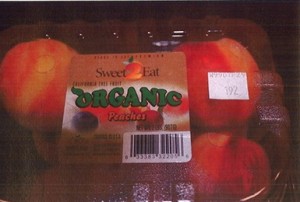We’ve received many comments from people who ate Wawona peaches, plums, nectarines, and pluots that have been recalled for Listeria and have been experiencing illness. It’s important to remember that no illnesses have yet been officially reported in connection with this recalled fruit, and that there is no guarantee that the fruit you purchased was contaminated.
 Listeria monocytogenes can cause two types of infections: listerial gastroenteritis, which is less serious, and invasive listeriosis, which is a serious blood infection. Listeriosis food poisoning is very rare; there are only 2,500 cases diagnosed in the U.S. every year out of 300,000,000 people.
Listeria monocytogenes can cause two types of infections: listerial gastroenteritis, which is less serious, and invasive listeriosis, which is a serious blood infection. Listeriosis food poisoning is very rare; there are only 2,500 cases diagnosed in the U.S. every year out of 300,000,000 people.
Still, it’s better to be safe than sorry. Listeria monocytogenes bacteria can cause serious illness, especially in very young children, the elderly, those with compromised immune systems and chronic illnesses, and pregnant women. If you have experienced the symptoms of a Listeria infection, which include flu-like fever and muscle aches, upset stomach or diarrhea, stiff neck, headache, loss of balance, confusion, or convulsions, please see your doctor immediately. Pregnant women may only have mild, flu-like symptoms.
The only way to tell that you have a Listeria infection is with a blood test or spinal tap. And the only way to tell if the infection came from Wawona fruit is with a genetic test on the bacteria called pulsed field-gel electrophoresis (PFGE). If you have a receipt for the fruit, save it.
It’s also important to remember that you should clean your kitchen and any other areas that were exposed to the recalled fruit with a mild bleach solution. First, get the fruit out of your home.
Then, put 1 teaspoon of bleach in a gallon of water and use that to wipe down the refrigerator interior or exterior, counters, the sink, sink handle, cupboard and drawer fronts, and cupboard and drawer handles. In addition, if you kept the fruit in a bowl, wash that as well as any tables the fruit was on. Listeria can grow at refrigerator temperatures, unlike other bacteria, so this is any important step.
Finally, try not to worry too much. Just keep an eye on your family. If anyone else develops the symptoms of an infection in the next 70 days, go to your doctor. The doctor is there for reassurance as well as for diagnoses.




